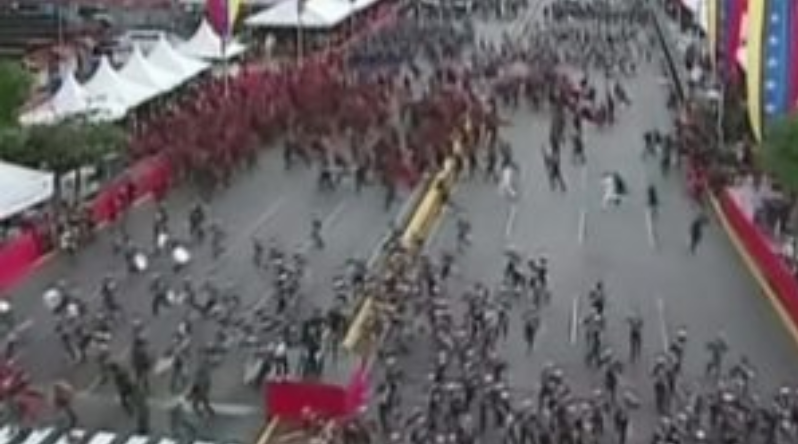On August 4, two explosions took place near the presidential pavilion at the celebration of the Bolivarian National Guard’s 81st Anniversary. The explosions interrupted Nicolás Maduro mid-speech and sent the entire event into chaos, with soldiers scattering and live state television interrupting its coverage. WOLA Senior Fellow David Smilde, and Assistant Director for Venezuela Geoff Ramsey, have been called upon by journalists to provided analysis and context.
While many speculated that the attack was staged by Maduro’s government itself, in an interview with NPR Weekend Edition, David Smilde called that implausible pointing out that the optics of the incident “made Maduro look terrible and having the images of him interrupted in mid-speech and his soldiers running away makes him look highly vulnerable.” Talking to El Independiente, he added “Maduro is in a strong position within his political movement and government, and has no organized political opposition.” Thus he would have no interest in staging such an attack.
In an interview with BBC Newshour, Smilde discussed who might have been behind the attack. He said it was likely to have been some “dissident military people” and probably did not “have any international element to it.” On Background Briefing with Ian Masters, he examined other theories of the attack including a dissident group, the “National Movement of Soldiers in T-shirts” (Soldados de Franela) who vaguely took credit for it.
The attack has led to discussion of what this means for the solidity of the Maduro government. As Ramsey told The Guardian, “Maduro is certain to use this to justify further repression of the opposition, and to rally his ruling circle around a perceived enemy threat.” Similarly, Smilde told the Associated Press that “Maduro will use [the incident] to concentrate power, further restricting liberty while purging the government and armed forces.” As the New York Times’ Nicholas Casey noted, Maduro tends to take advantage of these crises. But Smilde suggested in that article that this process has limits and that Maduro is getting to the point that he cannot pay military generals enough to make it worth their while to support him.
The fact that drones with explosives were able to get so close to the president is clearly a “lapse in security” and suggests “a pretty high level of dysfunction,” Smilde told CNN. Furthermore, images of National Guardsmen running for cover suggests rather superficial commitment to Maduro. In the interview with Ian Masters, Smilde pointed out that one of the main tasks of an autocrat is to make himself appear invincible, yet an event like this does exactly the opposite. In an article by Bloomberg, he suggested that the attack “could definitely spark other people’s imaginations.”



